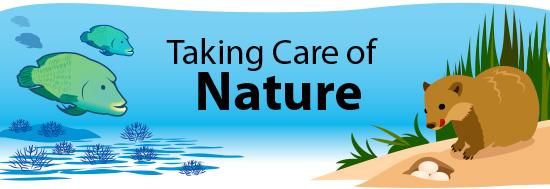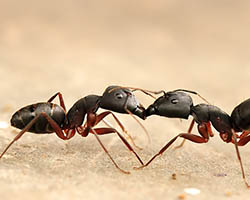show/hide words to know
Managing Ecosystems
A line of ants leads from your backyard into your home. You watch and follow the ants to see exactly where they are going. Outside, there are ants crawling near a mound of dirt, the bird feeder, and the dog food. It looks like they are entering the house under a door that has warped or changed shape from the weather. Inside your home, they are on your leftover cookie. What should you do?
Maybe you can use bug spray, put in a new door, or step on the ant mound. You decide you do not want to use bug spray because you are concerned about the effects of the chemicals. The door would cost money and may be hard to install. But you also do not want to hurt the ants by stepping on the mound that holds their colony.
Well, you saw the ants near the bird feeder, the dog food, and a cookie. These can all be sources of food for the ants to bring back to the colony. This is probably what the ants are attracted to. If you take away the sources of food for the ants, then maybe they will have no reason to crawl into your home.
To test this idea, you remove the seed from the bird feeder and clean up the dog food and your cookie. You wait for a while before checking on the ants again. Yes! The ants are no longer crawling into your home. You have found a solution that benefits you and the ants, which are now safely outside. That is what can happen with proper ecosystem management.
Making it a Win-Win
Ecosystem management is about deciding which solution is best from many perspectives. Choosing an option often depends on the humans involved in the problem.
Humans change ecosystems with activities like building homes and using resources. As a result, humans can damage natural resources and ecosystem services by not using them properly.
Solutions for protecting natural resources vary. It may be that one solution is the easiest, another is the cheapest, and a third helps the community the most. The best solution is usually the one that still allows people to use resources, but in a more responsible way.
Additional images via Wikimedia Commons. Girl in lake by Steve Hillebrand, U.S. Fish and Wildlife Service.
View Citation

It's important to think about the ways you interact with nature.
Be Part of
Ask A Biologist
By volunteering, or simply sending us feedback on the site. Scientists, teachers, writers, illustrators, and translators are all important to the program. If you are interested in helping with the website we have a Volunteers page to get the process started.










